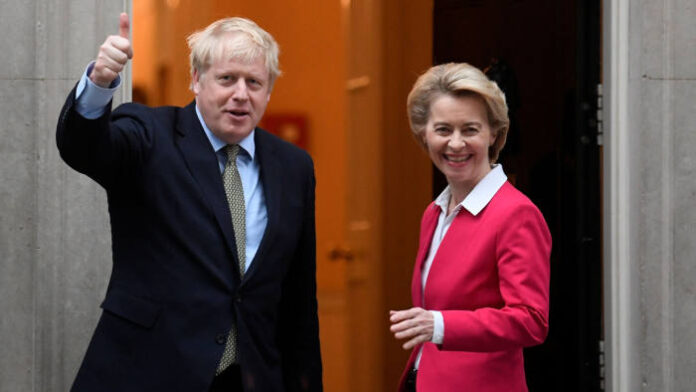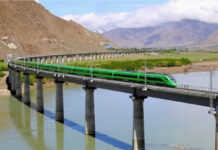Prime Minister Boris Johnson announced on Christmas eve the culmination of negotiations with the EU over a trade deal with the EU. The deal was finalized just before the expiry of one year transition period since Brexit last year. This set to rest speculation about the UK’s exit from the EU without an agreement which would have been damaging to both sides. Prime Minister recalled that the British people had voted in 2016 to ‘take back control of their money, their borders, their laws, and their waters and to leave the European Union’.
By Amb D P Srivastava
The Prime Minister described the agreement as a Canada-style deal worth 660 billion British Pounds, which would ensure tariff-free quota-free access for British exports to the EU. He said the UK has ‘taken back control of laws and our destiny’. He, however, stressed that his country will remain ‘culturally, emotionally, historically, strategically, and geologically attached to Europe.’
The European Commission president Ursula von der Leyen said that this was a ‘fair and balanced agreement with the UK, which will protect our European interests, ensure fair competition and provide much-needed predictability to our fishing communities. She added that ‘we can leave Brexit behind us and look to the future. Europe is now moving on.’
Much of Prime Minister Boris Johnson’s speech was a celebration of the UK winning back its sovereignty from Brussels. The European Commission President was more matter of fact in her comments. She said that ‘we should cut through the soundbites and ask ourselves what sovereignty means in the 21st century …No deal in the world can change reality or gravity in today’s economy and today’s world. We are one of the giants.’ This was a gentle reminder that the argument of sovereignty cannot ignore inter-dependence. By far, the EU has a greater heft.
Both the leaders were addressing domestic constituencies. Prime Minister Johnson began his press conference by referring to UK’s success in whittling down the transition period for fishing rights for EU in British waters from 12 years as demanded by the EU to 5 ½ years. Given the stakes on both sides, fishing rights are a minor part of the overall trade and economic relations. It has salience for the French fishermen. The balance of trade in goods is in the EU’s favour. Therefore, achieving tariff-free, quota-free access is not necessarily a win for the UK; the EU has a greater interest in preserving the principle. For the UK, the critical issue was to maintain access to EU markets for financial services. Here, British negotiators may have been less successful. Future access to each other’s market will not be automatic. It will require the grant of ‘equivalence’ status, which can be unilaterally revoked. This places London at a disadvantage in offering banking and financial services to the EU market.
The UK’s bet in offering a lightly taxed, less regulated market to attract trade and investment may not have worked out. Though the details have not been made public, the EU has managed to bind the UK to ‘convergence’ with EU regulations. Any departure from the principle will attract penalties. Prime Minister Boris Johnson emphasized that in such a case, the issue will be decided by Third Party arbitration, rather than the EU Court of Justice. This nevertheless was a tacit admission that the norm accepted by the UK is ‘convergence’. The UK will not be able to use arbitrage in terms of lower taxes or regulatory regime to divert business. This is what the comments of the European Commission President indicated when she said that the EU has achieved a commitment to a level playing field.
The Brexit deal will have implications for the UK at home. This could revive the demand for a second Scottish referendum. Nicola Sturgeon, Scotland’s first minister said that Britain’s departure from the EU was happening “against Scotland’s will”. She added that it has strengthened the argument for an independent Scotland. The Irish peace deal which requires free movement of goods and services has survived. However, there is not much enthusiasm on the part of Ireland. The Irish Prime Minister Micheal Martin while welcoming the deal said that this was the “least bad version of Brexit”.
The Brexit deal will not affect foreign and security policy issues. Both sides are expected to coordinate closely their positions on such matters. Britain is a permanent member of the UN Security Council and is a nuclear power. Most of the larger foreign policy questions, especially matters relating to the UN Security Council, were always dealt with outside the purview of the EU. For India, both the EU and UK are important. The EU is one of our largest trading partners. We have regular Summit level dialogue for two decades now. With the UK, we have a historical relationship. This is complemented by the presence of a large Indian diaspora. India enjoys a surplus in bilateral trade. Indian exports to the UK amounted to $ 8.737 billion in FY 2019-20, while our imports from that country were $ 6.712 billion.
Prime Minister Boris Johnson will be the chief guest at the Republic Day function. The UK will continue to be a major industrial power and a leader in technology and innovation. There are 842 Indian companies in the UK with a combined turnover of 41.2 billion British Pounds. There are 400 British companies in India. UK is the 4th largest inward investor in India, while India is the third-largest investor in the UK. The two countries are working together in the fight against COVID. The UK’s Oxford/Astra Zeneca vaccine is being manufactured at India’s Serum Institute in India. UK’s exit from the EU requires a new trade agreement with that country. This needs to be tied-up at the earliest.
This article first appeared in www.vifindia.org and it belongs to them. The author is a research associate with VIF.








